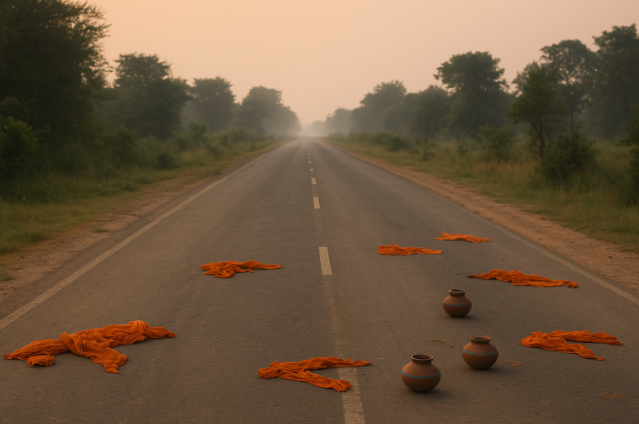
"The yatra is meant to bring blessings, not bodies.”
A sacred journey turned tragic on July 29th, when a bus full of Kanwariya pilgrims collided with a truck carrying LPG cylinders near Jamuniya village in Jharkhand’s Deoghar district. At least 18 devotees lost their lives, and over 24 were injured in one of the most harrowing road accidents during this year’s Shravani Mela.
For those walking barefoot in the name of Lord Shiva, the journey is spiritual—but this collision turned it into a catastrophe.
The Sacred Pilgrimage: Shravani Mela
Thousands of Kanwariyas, dressed in saffron and carrying the holy water of the Ganga, go to offer this water in temples such as Baba Baidyanath Dham in Deoghar and Basukinath in Dumka every year during the holy month of Shravan. Some even walk the entire 100 km, while others rent buses or trucks. It is one of the largest religious congregations in eastern India.
Nevertheless, infrastructural pressures and a lack of safety regulations have remained ever-present as the numbers have increased.
The Deadly Collision at Dawn
The bus had more than 35 Kanwariyas in it, the majority of them from Bihar, who had completed their rituals at the Basukinath temple and were heading back home. When the bus entered the Jamuniya forest area, it crashed head-on with a truck filled with gas cylinders.
It is reported that the bus driver had fallen asleep behind the steering wheel, and as a result, the bus moved into the wrong lane. The impact was dreadful; the front of the bus was demolished.
According to eyewitnesses, many of the passengers had fallen off their seats, while others were trapped inside the bus. Some survivors said they woke up because of someone screaming and the smell of smoke. The bus threw the driver off, and it kept moving before it stopped.
Emergency Response
Local villagers were the initial responders who dragged the survivors out and reported the incident to authorities. Fire brigades, Deoghar police, and NDRF teams arrived soon after. One crane was used to uproot the twisted bus body.
Deoghar Sadar Hospital was flooded with injured people, and those in critical condition were taken to AIIMS Deoghar. Survivors were stabilised by doctors working on a rotational basis.
Disputed Death Toll and Political Reactions
Initially, official sources stated that 6 people had died, but BJP MP Nishikant Dubey said that 18 pilgrims had died. Such inconsistency has confused and raised concerns about proper reporting and transparency in response.
Reactions poured in across political and religious lines:
Prime Minister Narendra Modi tweeted expressing grief and said it was a saddening incident, and expressed hope that the injured would recover soon.
Jharkhand Chief Minister Hemant Soren condoled the deaths and announced monetary assistance for the families of the deceased.
Union Home Minister Amit Shah also urged that better security arrangements be put in place for religious yatras.
Voices from the Ground
Residents shared heart-wrenching stories:
“I saw bodies lying on the road and a woman screaming for her son who was stuck under a seat,” said a shopkeeper near the accident site.
Pilgrims also raised concerns about safety standards. Others attributed the tragedy to a shortage of rest stops and the unchecked substitution of drivers, particularly during nighttime travel when fatigue is high.
When Faith Collides with Reality
This tragedy throws the spotlight on how religious devotion can come into conflict with failing rural transport safety in India.
- Driver Fatigue is Deadly
Itineraries of pilgrims are exhausting. To prevent such lapses, prescribed rest periods and two-driver regulations should be enforced during Shravani Mela. - Rural Infrastructure Needs Upgrades
Other pilgrimage routes, such as the one in Jamuniya, are narrow, dimly lit, and lack emergency lanes. Lives can be saved with better investments in signage, barriers, and on-call medical teams. - Official Coordination Matters
The discrepancy in the number of recorded deaths indicates that the administration and on-ground responders were not in sync. Real-time public information systems are critical in cases of high casualties. - Pilgrim Safety Must Be Prioritised
Religious enthusiasm draws millions to the roads of India, but faith cannot substitute for preparedness. Safety must be integrated into religious event planning—from vehicle checks to crowd management.
Final Thought
Where in the streets the Bol Bam call is shrieked to heaven, there is now a mumbling void in villages whose visitors have vanished. What should have been a source of blessings to these individuals has turned into a tragedy for thousands of families.
This is not a coincidence—it is a call to be credible. Governments and citizens must work together to provide infrastructure, awareness, and safety when people are driven by faith onto the roads.
Let not devotion become a death sentence.
